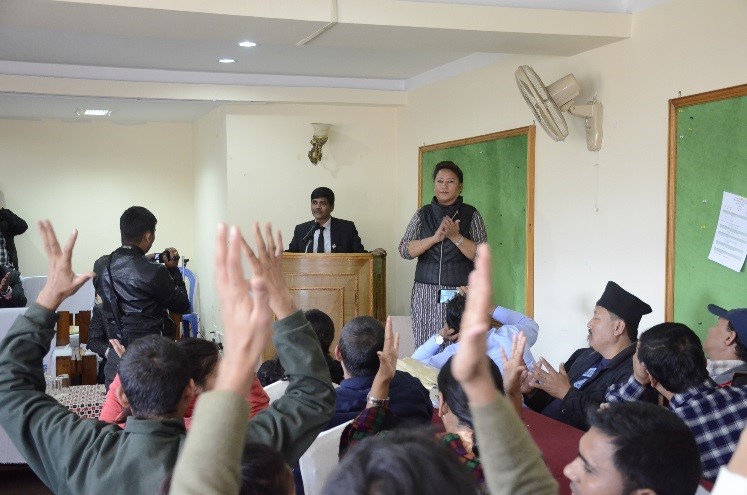“The democratic process, which is the cornerstone of peace, security and prosperity, is not complete without inclusion of all, including people with disability,” Dr. Ayodhee Prasad Yadav, the Chief Commissioner, emphasized in an interaction programme between the Election Commission of Nepal (ECN) and the National Deaf Federation Nepal (NDFN).
The event, held on 12 November in Dulikhel near Kathmandu, was designed to disseminate critical information about the State Assembly and House of Representatives elections to members of the community of people with hearing disability, which is said to number well over 100,000 in Nepal. It was supported by Electoral Support Project (ESP) as part of the project’s work for an inclusive election process, which contributed to sustained ECN engagement with organizations of people with disabilities over the years.
Representatives from 52 districts took part and were tasked with disseminating the information in their districts upon their return. They were provided information on legal provisions related to the electoral process, the new structures of government in the 2015 Constitution, the ECN Gender and Inclusion Policy as well as citizen duties and responsibilities in the context of elections. Mock polling and counting was conducted at the end of the program. All sessions and discussions were translated in sign language.
“The main objective of the workshop is to increase the meaningful participation of voters with special needs in terms of communications and to decrease the number of invalid votes”, Mr. Chandra Shiwakoti, an Under-Secretary at the ECN and one of the facilitators in the workshop, explained, “The ECN is continuing its effort to enable people with any kind of physical disability to cast their vote”.
Mr. Poudyal, a participant, shared his appreciation: “Without this programme, we would have been confused when marking the ballot papers, because nobody would have explained the process to us in sign language”.

Mr. Ojha, another participant, added: “Deaf people in my district are very enthusiastic to vote in this very important election, but many think that the voting process is the same as in the local elections. So, it is very important to explain the differences to them, otherwise their votes would be wasted”.
Mr. KP Adhikari, the NDFN President, strongly believes that such information dissemination programmes, facilitated in sign language, significantly increase the participation of voters with hearing disability. “This initiative to make deaf people aware and informed about the electoral process is highly appreciated, but not sufficient. The government has committed to safeguarding the rights of people with disabilities, but much work remains to be done to put this into practice.”
The ECN Gender and Inclusion Strategy and Policy has examples of how this can be done. In order to make the electoral process more accessible to people with disabilities, ECN implements, produces and broadcasts a special bulletin on elections-related news in sign language and sets up a dedicated hotline for people with physical disability. With support from ESP, the Commission also produced a sign language version of its “how to mark the ballot paper” animation.
Following the programme, participants returned to their own districts and are disseminating the election-related messages to their affiliated members and communities, working to increase the effective and meaningful participation of people with disabilities in the 26 November and 7 December elections.
Photo credits: UNDP Nepal/ESP
The Electoral Support Project- Phase II (ESP) is a technical assistance initiative which focuses on a long-term institutional and professional capacity development of the Election Commission (ECN) for conducting credible, inclusive and transparent elections. The objectives of the project are 1) to strengthen the capacity of the ECN to function as an independent and credible institution, 2) to allow the conduct of the election cycle in an effective, sustainable, and credible manner, and 3) to increase democratic participation, particularly for under-represented and disadvantaged segments of the Nepali society. ESP is currently funded by EU.
